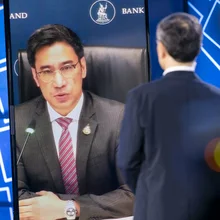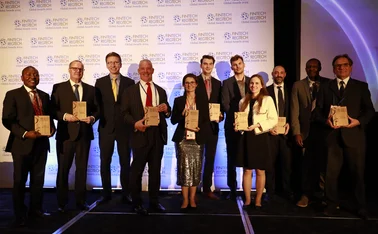
Initiative: BoT and MAS’s PromptPay-PayNow link
Connecting the two nations’ instant payment systems is empowering citizens

Nations around the world have become far more interconnected during the past few decades. Yet numerous problems still exist related to the speed, convenience, cost and security of making cross-border remittances among different countries.
This may now be set to change, following an initiative by the central banks of two Association of Southeast Asian Nations (Asean). The Monetary Authority of Singapore (MAS) and Bank of Thailand (BoT) introduced the PromptPay-PayNow link in April 2021, in what they claim to be the first fast payment system linkage in the world.
Customers of the two countries’ respective instant payment schemes can now send up to S$1,000 (US$734) or 25,000 baht (US$764) daily to each other via the international cross-border payment linkage. And the two central banks plan to raise that limit to accommodate growing business transactions as the number of users rises.
Prior to PromptPay-PayNow’s launch, senders had to pay on average 10% of the amount remitted to send funds between the two countries – and it took anywhere from a couple of hours to several days for the funds to arrive.
The process was also not convenient, as senders needed to provide various pieces of information for the transaction to take place, such as the beneficiary’s name, address, bank account and bank code.
Consumers have relied on traditional bank transfers and remittances to send money across borders in the Asean region, as elsewhere. Opportunistic financial intermediaries often mark up exchange rates and charge superfluous transfer fees for cross-border transfers. Even intermediaries that do not engage in outright price gouging may not provide sufficient transparency in terms of displaying fees, exchange rates or transaction times. And carrying cash comes with a physical danger as well as high exchange rate fees.

The PromptPay-PayNow participating banks have committed to benchmark their fees against the market. This means the fees should be affordably priced and transparently displayed to senders prior to confirming their transfers, according to the central banks.
Transactions can take place anywhere in near-real time, 24 hours a day, 365 days a year. Senders only need to provide the recipient’s mobile phone number as a proxy, thus eliminating the need to populate multiple information fields – similar to what Thais and Singaporeans experience when using their own domestic fast payment systems. Senders are also able to view beneficiaries’ names prior to sending their funds.
“As the transactions are made through national infrastructures, IT security for the linkage is on par with internationally accepted standards. Moreover, all transactions are screened in accordance with [anti-money laundering and countering the financing of terrorism] laws and regulations in both jurisdictions,” Pariwat Kanithasen, deputy director of payments for the BoT, tells Central Banking.
MAS and BoT officials say that preliminary data of PromptPay-PayNow transactions “indicate growing usage” for both legs, with a total of 200,000 transactions worth US$44 million taking place since the scheme’s inception in April 2021. This means that migrant workers and members of the general public are reaping the benefits of this linkage, despite travel restrictions imposed due to Covid-19.
Both Singapore and Thailand are looking to add international partners to their payment systems and extend their payment limits upwards to allow larger businesses to operate on them. The PromptPay-PayNow link also offers the opportunity to use distributed ledger and smart contract technologies in retail cross-border payments in the future.
“Looking forward, the Bank of Thailand will continue to promote innovation in cross-border payments and infrastructure to strengthen financial integration for the sustained wellbeing of the country and the Asean region,” said Sethaput Suthiwartnarueput, governor of the Bank of Thailand, at the time of the launch.
The BoT’s team found that regulatory and technical challenges linked to person-to-person cross-border payments were more difficult than person-to-business payments, where it has actively promoted payment by PromptPay using QR codes. The QR system has some potential advantages over credit cards as merchant acceptance can be tied to QR codes. This means, for example, that a street vendor in one country can provide a QR code that the customer from another country can scan using the camera of their smartphone, and then pay via their instant payment app. Pariwat says merchants also benefit from lower fees compared with the routine 3% charged by credit card schemes – although consumers do not gain from bonus schemes or other benefits.

The BoT, meanwhile, was able to link its person-to-merchant system with payment systems in Vietnam, Malaysia, Indonesia and Singapore during 2021. This means that Thai tourists visiting any of these countries are now able to pay using just a smartphone in the same way they would pay domestically. Indonesia provided a unique challenge for the Thai team as it involved four separate payment service systems to hook up to Thailand’s PromptPay. Even though Thailand has not extended its domestic service to non-banks, non-banks have joined the system through other countries such as Indonesia. Singaporeans also have plenty of opportunities to make cross-border person-to-merchant payments in the region using QR codes. Examples include regional tie-ups by Nets, DBS PayLah!, OCBC Pay Anyone, UOB TMRW, GrabPay, Singtel Dash and LiquidPay.
Thailand and Singapore are also looking to build their instant person-to-person, cross-border payment infrastructure. At the launch of the system in April 2021, MAS managing director Ravi Menon said the Singaporean central sought “to expand this bilateral linkage into a network of linked retail payment systems across Asean”. This means that PromptPay-PayNow’s basic system design represents a cornerstone collaboration under the Asean Payment Connectivity scheme, which was initiated in 2019. It is also a step closer towards international efforts to facilitate faster, cheaper, more inclusive and more transparent cross-border payments.
The Central Banking Awards were written by Christopher Jeffery, Daniel Hinge, Dan Hardie, Victor Mendez-Barreira, Ben Margulies and Riley Steward
Only users who have a paid subscription or are part of a corporate subscription are able to print or copy content.
To access these options, along with all other subscription benefits, please contact info@centralbanking.com or view our subscription options here: http://subscriptions.centralbanking.com/subscribe
You are currently unable to print this content. Please contact info@centralbanking.com to find out more.
You are currently unable to copy this content. Please contact info@centralbanking.com to find out more.
Copyright Infopro Digital Limited. All rights reserved.
As outlined in our terms and conditions, https://www.infopro-digital.com/terms-and-conditions/subscriptions/ (point 2.4), printing is limited to a single copy.
If you would like to purchase additional rights please email info@centralbanking.com
Copyright Infopro Digital Limited. All rights reserved.
You may share this content using our article tools. As outlined in our terms and conditions, https://www.infopro-digital.com/terms-and-conditions/subscriptions/ (clause 2.4), an Authorised User may only make one copy of the materials for their own personal use. You must also comply with the restrictions in clause 2.5.
If you would like to purchase additional rights please email info@centralbanking.com






